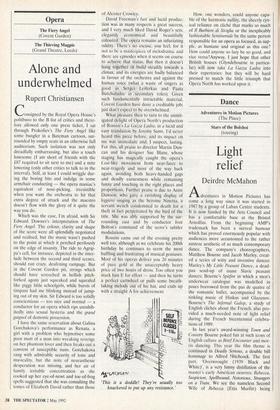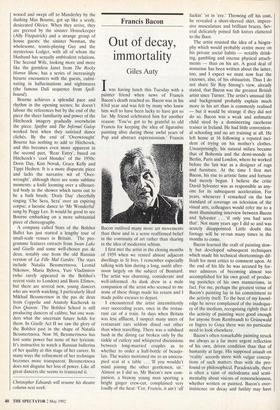Dance
Adventures in Motion Pictures (The Place) Stars of the Bolshoi (touring)
Light relief
Deirdre McMahon
Adventures in Motion Pictures has come a long way since it was started in 1987 by a group of Laban Centre students. It is now funded by the Arts Council and has a comfortable base at the Bristol Arnolfini. From the beginning AMP's trademark has been a surreal humour which has proved enormously popular with audiences more accustomed to the rather austere aesthetic of so much contemporary dance. The company's choreographers, Matthew Bourne and Jacob Marley, creat- ed a series of witty and inventive dances: Marley's My Little Peasant Dance, a dead- pan send-up of inane Slavic peasant dances; Bourne's Spitfire in which a men's underwear catalogue was modelled in poses borrowed from the pas de quatre of the romantic ballet, accompanied by the tinkling music of Hinkus and Glazunov. Bourne's The Infernal Galop, a study of English clichés about the French, also pro- vided a much-needed note of light relief during the French bicentennial celebra- tions of 1989.
In last year's award-winning Town and Country Bourne poked fun at such icons of English culture as Brief Encounter and mor- ris dancing. This year the film theme is continued in Deadly Serious, a double bill hommage to Alfred Hitchcock. The first part, 'Overwrought (1939 Black and White)', is a very funny distillation of the master's early American oeuvres: Rebecca, Suspicion, Spellbound, Notorious, Strangers on a Train. We see the nameless Second Wife of Rebecca (Etta Murfitt) being wooed and swept off to Manderley by the dashing Max Bourne, got up like a seedy, desiccated Olivier. When they arrive, they are greeted by the sinister Housekeeper (Ally Fitzpatrick) and a strange group of house guests: the sinister Norman, the wholesome, tennis-playing Guy and the mysterious Lodger, with all of whom the Husband has sexually ambivalent relations. The Second Wife, looking more and more like the gormless Janet from The Rocky Horror Show, has a series of increasingly bizarre encounters with the guests, culmi- nating in hallucinations and nightmares (the famous Dali sequence from Spell- bound).
Bourne achieves a splendid pace and rhythm in the opening scenes; he doesn't labour the references but by the end of the piece the sheer familiarity and power of the Hitchcock imagery gradually overwhelm the piece. Spitfire and The infernal Galop worked best when they satirised dance clichés. By the end of 'Overwrought' Bourne has nothing to add to Hitchcock, and this becomes even more apparent in the second part, 'Rear Entry', based on Hitchcock's 'cool blondes' of the 1950s: Doris Day, Kim Novak, Grace Kelly and Tippi Hedren. It is a more disparate piece and lacks the narrative wit of 'Over- wrought', although there are some sublime moments: a knife looming over a silhouet- ted body in the shower which turns out to be a bath brush; 'Doris Day' cheerfully singing `Che Sera, Sera' over an expiring corpse; a laconic dance to 'Mr Wonderful' sung by Peggy Lee. It would be good to see Bourne embarking on a more substantial piece of choreography.
A company called Stars of the Bolshoi Ballet has just started a lengthy tour of small-scale venues in Britain. The pro- gramme features extracts from Swan Lake and Giselle and some well-chosen pas de deux, notably one from the old Russian version of La Fille Ma! Gardee. The stars include Natalia Bessmertnova, Leonid Nikonov, Maria Bylova, Yuri Vladimirov (who rarely appeared in the Bolshoi's recent visits to London) and Boris Efimov, but there are several new, young dancers who are worth watching. I particularly liked Mikhail Bessmertnov in the pas de deux from Coppelia and Anatoly Kucheruk in Don Quixote. The Bolshoi School is still producing dancers of calibre, but one won- ders what the uncertain future holds for them. In Giselle Act II we saw the glory of the Bolshoi past in the shape of Natalia Bessmertnova. Now 50, Bessmertnova has lost some power but none of her lyricism. It's instructive to watch a Russian ballerina of her quality at this stage of her career. In many ways the refinement of her technique becomes more transparent. Bessmertnova does not disguise her loss of power. Like all great dancers she seems to transcend it.



















































 Previous page
Previous page